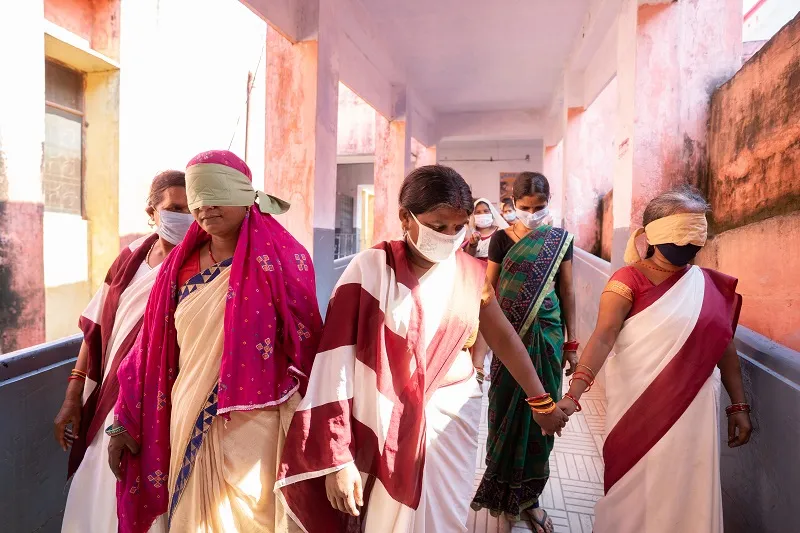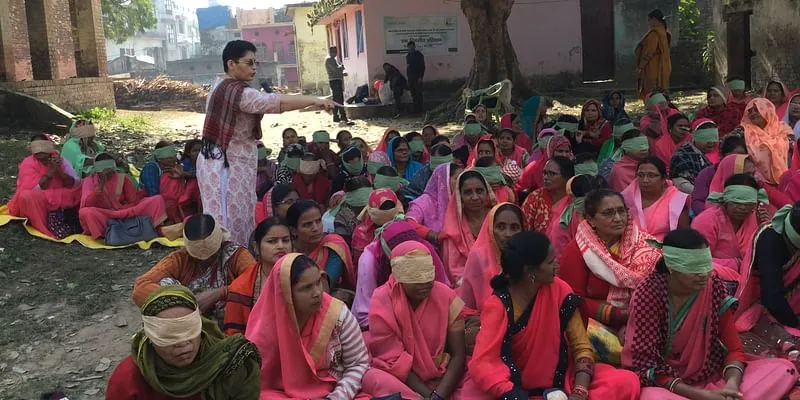Perkins India aims to make a difference in the lives of children with disabilities through health and education
Perkins India identifies children with disabilities and helps them with aid and access to healthcare, therapy, and education. It also trains teachers and Anganwadi workers so that they can help the organisation in its efforts.
Nine-year-old Ishan, from a village in Uttar Pradesh, was born with vision impairment and a learning disability. Although he was eager to learn new skills, there wasn’t any programme to cater to his special learning needs—until a Perkins-trained Anganwadi worker connected him to Perkins India.
The Perkins India team enrolled Ishan at a school in his village and also provided him access to healthcare. A special educator visited him once a week to help him learn all pre-academic skills such as colours, shapes, and counting. The educator essentially worked with the school’s teacher to understand Ishan’s needs and learning capabilities. Today Ishan can learn and communicate with his community using sign language.
Ishan is one of the many children whose lives Perkins India has touched in the state of Uttar Pradesh. The India division of the global not-profit organisation identifies children with disabilities and helps them with aid and access to healthcare, therapy, and education. Perkins India also trains teachers, Asha workers, and Anganwadi workers so that they can support the organisation in its efforts.

Asha workers doing simulation activity
Perkins India has worked across states such as Maharashtra, Manipur, Rajasthan, and Chandigarh. However, since 2018, the organisation has been focusing on early childhood education across four districts in Uttar Pradesh. It is now expanding to Madhya Pradesh as well.
“We selected UP because we realised that the maximum population of children with disabilities exists in the state and it also has very limited resources,” says Sampada Shevde, Director, Perkins India.
Perkins India focuses on rural areas as it believes there is a large number of children with disabilities here compared to urban areas. Rural areas also suffer from lack of services and resources.
Capacity building
Early childhood intervention and education is the core aim of the organisation. Perkins works on the strong belief that ‘every child can learn’ and that ‘every child with disability must have access to education and health’.
“We serve children with disabilities, with special focus on complex disabilities and visual impairment. Our primary objective is to work towards building an inclusive world for every child to have access to healthcare and education. We hope to provide dignity and equal opportunity to families, communities, and children,” says Barsha Banerjee, Managing Director, Perkins India.
The activities of the organisation include incorporating new education programmes, strengthening existing services, training healthcare and education professionals, and providing families with support.
The basic philosophy of Perkins is to work with local partners and handhold them for three to five years, helping build their capacity to support children. As part of its capacity building, skill development, and mentorship efforts, Perkins India offers practical training and coaching to community-based rehabilitation workers, special educators, government school teachers, university students pursuing special education, physicians, healthcare professionals, parents, and policy makers.
Experiential curriculum
“We teach children in the environment and the community they live in. The teaching includes helping children learn how to walk to the well, how to identify how to walk back, how to ask for help etc., so that the child can do this day in and day out, in their own community,” says Barsha.
Perkins has introduced a fun-filled experiential learning method with games and activities. This is aimed at reimagining traditional learning, making it more experiential.

Perkins India working with the children
“We don’t just focus on functional skills like eating, bathing, helping around the house etc. We also believe that children need to engage in extra-curricular activities, build their social skills, acquire orientation mobility, and learn how to navigate their environment. We build in a lot of ‘fun’ in our curriculum. It’s a lot about the overall development,” says Barsha.
How Perkins operates?
First, Perkins identifies children with needs. Once this is done, the Perkins team connects with the Gram Pradhan of the village, school principals, and education coordinators to create awareness. This is followed by screening at houses, hospitals, schools and other community centres and a medical assessment.
“Assessment is done so that children get the right assisted devices that they need—whether it is spectacles, hearing aid, wheelchair, or cerebral palsy chair,” says Sampada.
Perkins India works with the family to identify the appropriate method of intervention based on the needs of the child—be it enrolling in a government school or an anganwadi or offering home-based support.
“Normally we see inclusive and special schools and special educators. This is a different setup. It’s not just the child and teacher. The family also gets involved, which is important for the development of the child,” Geeta Philip, Lead, Communications, Perkins India.

Training for Anganwadi workers
Perkins India also follows up frequently with the local partners (Asha workers and village administrators) to ensure that the children and their family receive the required support.
“The model is replicable and is aimed to create a sustainable system of support within the state and the local government,” says Sampada.
Unlocking opportunities
“In the run-up to the UN’s sustainable development agenda for 2030 and the call for ‘inclusive and equitable quality education’, we believe it’s time to unlock learning opportunities through our model of ‘reimagining learning through play and fun’. We would like to reach out to several states across India for this purpose,” says Barsha.
Edited by Swetha Kannan








